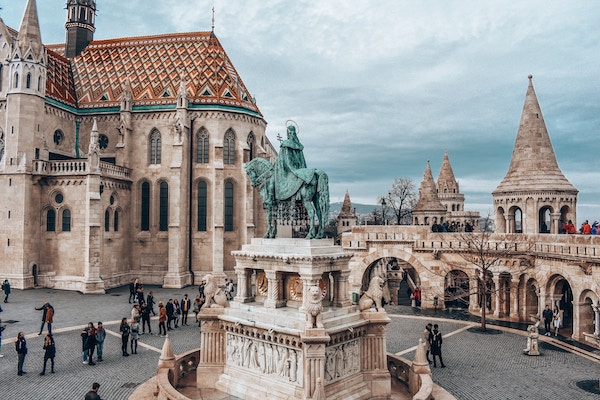- Home
- IELTS Vocabulary
- Topic Vocabulary
- History and Heritage Vocabulary for Ielts
History and Heritage Vocabulary for IELTS
This list provides essential history and heritage vocabulary for IELTS. There's also a podcast so you can hear the definitions and examples of the words discussed.
There are often questions in the speaking and writing that might involve using this kind of vocabulary and knowing a range of vocabulary is also useful for texts you might get in the reading test.
Essential History and Heritage
Vocabulary for IELTS

Ancestry
One's family or ethnic descent.
- "She was proud of her Native American ancestry."
- "Understanding your ancestry can give you insight into your family's past."
Ancient
A period in history typically characterised by its great age, often used to describe civilisations, cultures, or artifacts from a distant past.
- "The ancient city of Rome is renowned for its rich history and architectural marvels".
- "The archaeologists discovered an ancient burial site dating back thousands of years".
Antiquity
A period of history before the Middle Ages, typically regarded as a time of great cultural achievement, particularly in Greece and Rome.
- "The Parthenon in Athens is a remnant of Greek antiquity."
- "He is an historian specializing in Roman antiquity."
Archaeology
The study of human history and prehistory through the excavation of sites and the analysis of artifacts and other physical remains.
- "Archaeology offers us a window into the civilizations of the antiquity."
- "The archaeology professor is leading a dig site in Egypt this summer."
Artefacts
Objects made by humans, typically with cultural or historical significance, often found in archaeological excavations.
- "The museum displayed a vast collection of artefacts ranging from ancient pottery to medieval weaponry".
- "Archaeologists unearthed several well-preserved artefacts, shedding light on the daily lives of ancient civilisations".
Chronicle
A factual written account of important or historical events in the order of their occurrence.
- "The book chronicles the events leading up to the French Revolution."
- "Her diary served as a poignant chronicle of her life during the war."
Civilisation
The stage of human social development and organization which is considered most advanced.
- "Ancient Greece is renowned for its contributions to western civilization."
- "Some civilizations developed complex writing systems, whilst others relied on oral tradition."
Colony
A country or area under the full or partial political control of another country and occupied by settlers from that country.
- "Australia started as a British colony in the 18th century.”
- "The American thirteen colonies declared independence from Britain on July 4th, 1776."
Conservation
The protection, preservation, and management of natural resources, cultural heritage, or artifacts to ensure their sustainability and longevity for future generations.
- "The national park implemented strict conservation measures to protect endangered species and fragile ecosystems".
- "The museum's conservation team worked tirelessly to restore the deteriorating paintings to their original glory".
Culture
The customs, arts, social institutions, and achievements of a particular nation, people, or other social group.
- "Japanese culture is celebrated during the annual festival in the city's public park."
- "She is very interested in learning about Indigenous culture."
Cultural exchange
The mutual sharing, interaction, and exchange of ideas, traditions, customs, beliefs, art, and other aspects of culture between different societies, groups, or individuals.
- "The university organised a cultural exchange program where students from various countries could share their customs and traditions with each other".
- "Through cultural exchange initiatives, the two nations fostered a deeper understanding and appreciation of each other's heritage and values".
Democracy
A system of government by the whole population or all the eligible members of a state, typically through elected representatives.
- "The country transitioned towards democracy after years of dictatorship."
- "In a democracy, every vote matters."
Descendants
A person, plant, or animal that is descended from a particular ancestor.
- "We are all descendants of our biological parents."
- "She discovered her family's rich history while tracing back her line of descendants."
Empire
An extensive group of states or countries ruled over by a single monarch, an oligarchy, or a sovereign state.
- "The Roman Empire was an important part of world history."
- "At its height, the British Empire was the largest empire in history."
Heritage
Valued objects and qualities such as historic buildings and cultural traditions that have been passed down from previous generations.
- "The city's rich heritage is reflected in its historic architecture."
- "The festival celebrates the diverse cultural heritage of the local community."
Independence
The fact or state of being independent, especially as the freedom from being governed or ruled by another country.
- "India gained independence from Britain in 1947."
- "The American Revolution was fought to achieve independence from England."
Legacy
Anything handed down from the past, as from an ancestor or predecessor.
- "Martin Luther King Jr. left a profound legacy of promoting civil rights and racial equality."
- "The legacy of ancient Rome can be seen in modern Western societies."
Lineage
Direct descent from an ancestor; ancestry or pedigree.
- "She traced her lineage back to the Mayflower."
- "The purebred dog had an impressive lineage of champion show dogs."
Migration
The act of moving from one region or country to live in another.
- "The Great Migration saw millions of African Americans move from the rural Southern United States to the urban Northeast, Midwest, and West."
- "Her family's migration story is a tale of resilience and strength."
Monarch
A sovereign head of state, especially a king, queen, or emperor.
- "The monarch's coronation ceremony was held in the cathedral."
- "The reign of the current monarch has lasted four decades.
Monument
A statue, building, or other structure erected to commemorate a famous or notable person or event.
- "The Washington Monument is an iconic feature of the Washington D.C. skyline."
- "The monument commemorates the victims of the war."
Museum
A building in which objects of historical, scientific, artistic, or cultural interest are stored and exhibited.
- "The Louvre Museum in Paris is home to the infamous painting, Mona Lisa."
- "The local museum offers interactive exhibits for children to learn about history."
Pioneer
A person who is among the first to explore or settle a new country or area.
- "The Wright brothers were pioneers in aviation."
- "She is considered a pioneer in cancer research."
Preservation
The action of preserving something, particularly relating to historic buildings, artifacts, landscapes or cultures.
- "The preservation of historic sites is important in maintaining a connection to the past."
- "Many countries have laws promoting the preservation of endangered species."
Relic
An object surviving from an earlier time, especially one of historical interest.
- "The museum displayed a relic from the American Civil War."
- "The religious relic is said to possess healing powers."
Revolution
A forcible overthrow of a government or social order, in favor of a new system.
- "The French Revolution is a critical period in European history."
- "The revolution motivated people to fight for their rights."
Tradition
The transmission of customs or beliefs from generation to generation, or the fact of being passed on in this way.
- "The annual holiday parade is a long-standing tradition in our town."
- "Breaking the wishbone is a common tradition following Thanksgiving dinners."
Settlement
A place, typically one which has previously been uninhabited, where people establish a community.
- "The settlers established a new settlement near the river."
- "The Pilgrims formed the Plymouth Settlement in 1620."
Tribute
An act, statement, or gift that is intended to show gratitude, respect, or admiration, often in relation to a significant historical event or person.
- "They raised a statue as a tribute to the war veterans."
- "The concert was held as a tribute to the late musician."
View a model essay that uses history
and heritage vocabulary for IELTS:
Return of Historical Objects and Artefacts >>
Comments
Any comments or questions about this page or about IELTS? Post them here. Your email will not be published or shared.











